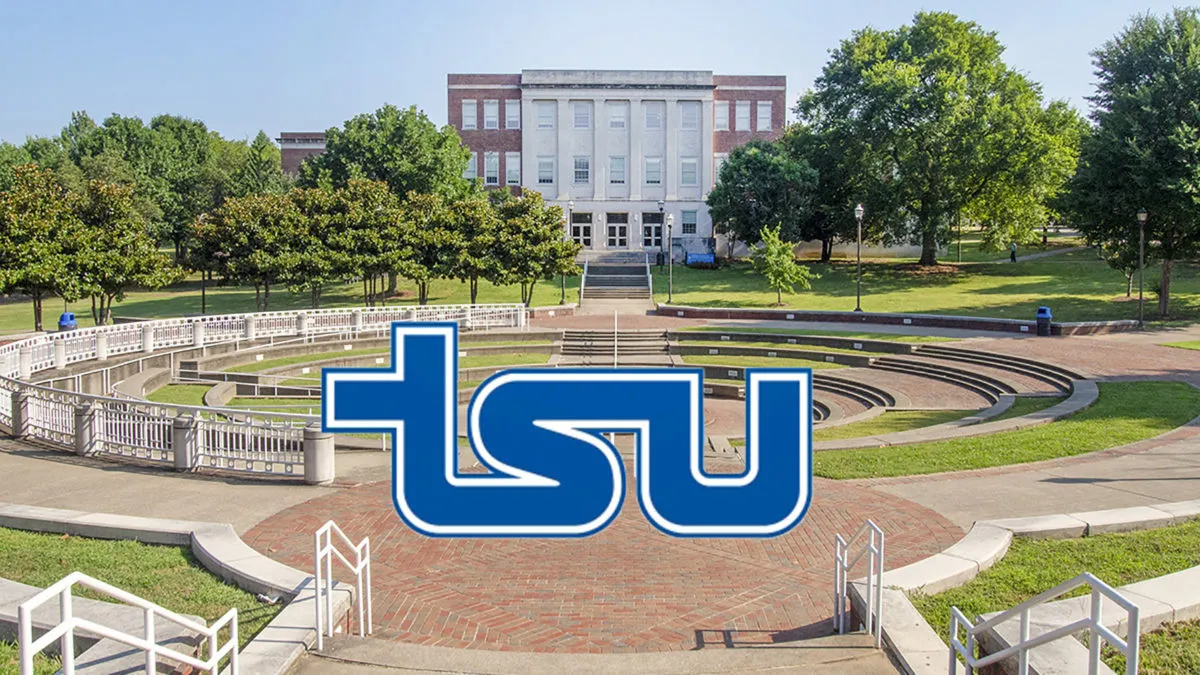
Tennessee State University Acceptance Rate: Tennessee State University, located in Nashville, TN, is a historically black public university.
Across its nine schools, TSU offers 45 bachelor’s degree programs, with more than 25% of students pursuing degrees in health-related fields.
Its research centers, which include the Center of Excellence for Battlefield Sensor Fusion and the Center of Excellence in Information Systems and Engineering Management, receive an annual budget of $32 million for sponsored research.
There are over 65 student organizations and five fraternities and sororities on campus that offer extracurricular activities.
TSU athletes have made a significant impact in the Olympics, where they compete in NCAA Division I athletics. Two-time gold medalist Ed Temple, the track coach, has guided 40 athletes to 13 gold medals.
Tennessee State University Acceptance Rate
The acceptance rate to Tennessee State University is 93%. Between 978 and 1233 on the SAT or between 15 and 20 on the ACT are the test scores of half of the admitted applicants to Tennessee State who provided them.
Nonetheless, 25% of candidates who were accepted had scores that were higher than these ranges, and 25% had lower scores. Tennessee State University is accepting applications through a rolling deadline.
Tennessee State University admissions officers don’t take a student’s GPA into account. Applicants’ letters of recommendation and high school class rank are not taken into account by Tennessee State University admissions officers.
READ ALSO!!!
- University of Victoria Acceptance Rate For Students 2024
- Urbana Champaign Acceptance Rate for College Students
- Boston College Transfer Acceptance Rate for Students
- Minnesota Acceptance Rate For Student
- Berkeley Transfer Acceptance Rate for College Students
Overview of Tennessee State University
More than 400 top-notch faculty members work full-time at the university, most of whom aim to impart knowledge that students will find useful in their post-graduation lives.
The remaining faculty members are committed to research and development, working on innovative projects meant to tackle a range of pressing societal issues. Others concentrate their efforts on education and public service.
As a result, students are taught by outstanding professionals who are well-versed in a wide range of aspects related to their fields in a diverse and immersive manner.
Students who are enrolled regularly take part in study abroad programs, research, internships, cultural events, service learning, and student life activities.
Tennessee State University is a renowned public urban institution that is an HBCU and land grant university known for its outstanding innovation, instruction, research, creativity, and service.
This is accomplished by encouraging academic excellence in students and offering accessible and reasonably priced educational programs at the majority of degree levels. Graduates become diverse leaders with a passion for public service, lifelong learning, research, and scholarly pursuits when they enter the workforce.
SAT and ACT Requirements
The requirements for standardized testing vary by school. While many colleges do not require the SAT or ACT, many do consider your scores if you choose to submit them.
Although Tennessee State University hasn’t stated in explicit terms what its policy is regarding SAT/ACT requirements, it’s probably test-flexible because it has released average SAT and ACT scores (we’ll talk about this in a moment).
These colleges typically advise applicants to submit their scores if they believe they accurately reflect their abilities as a students. If not, do not.
The majority of students take the SAT or ACT despite this policy, and the majority of applicants to Tennessee State University submit their results.
In comparison to other students, you will have one less way to demonstrate your merit for admission if you fail to turn in your test results. For this reason, we advise you to think about taking and passing the SAT or ACT.
READ ALSO!!!
- United States Air Force Academy Acceptance Rate 2024
- University of Florida Out of State Acceptance Rate
- Carnegie Mellon Transfer Acceptance Rate for 2024
- UOP Acceptance Rate 2024 For Student
- UW Acceptance Rate for College Students
Academics
Tennessee State University’s academic programs are known for their excellence and are made to emphasize the value of research, teaching, learning, and service.
The establishment of an intellectually stimulating and encouraging environment for students is crucial to the development of well-informed and productive members of society. Among the core values are working tirelessly, thinking beyond the box, forming excellence as a habit, and learning something new every day.
In the fields of biological sciences, curriculum and instruction, engineering and computational sciences, educational leadership, physical therapy, public policy administration, and psychology, students have access to over 40 bachelor’s programs, more than 20 master’s programs, and doctoral degrees.
There are 5,875 undergraduate students out of the little over 8,000 total number of students enrolled. There are 12 students for every faculty member because most enrolled students attend classes full-time.
This implies that there will be plenty of opportunities for students to receive one-on-one attention from instructors in relatively small classes.






